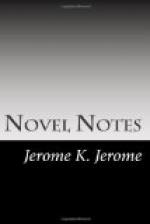His back is towards me, and I crawl forward inch by inch. I have a knife in my hand, with a strong, curved blade; and when I am near enough I kill him as he kneels there.
His body falls against the door, and it shuts to with a clang, and I try to open it, and cannot. I beat my hands against its iron nails, and scream, and the dead man grins at me. The light streams in through the chink beneath the massive door, and fades, and comes again, and fades again, and I gnaw at the oaken lids of the iron-bound chests, for the madness of hunger is climbing into my brain.
Then I awake, and find that I really am hungry, and remember that in consequence of a headache I did not eat any dinner. So I slip on a few clothes, and go down to the kitchen on a foraging expedition.
It is said that dreams are momentary conglomerations of thought, centring round the incident that awakens us, and, as with most scientific facts, this is occasionally true. There is one dream that, with slight variations, is continually recurring to me. Over and over again I dream that I am suddenly called upon to act an important part in some piece at the Lyceum. That poor Mr. Irving should invariably be the victim seems unfair, but really it is entirely his own fault. It is he who persuades and urges me. I myself would much prefer to remain quietly in bed, and I tell him so. But he insists on my getting up at once and coming down to the theatre. I explain to him that I can’t act a bit. He seems to consider this unimportant, and says, “Oh, that will be all right.” We argue for a while, but he makes the matter quite a personal one, and to oblige him and get him out of the bedroom I consent, though much against my own judgment. I generally dress the character in my nightshirt, though on one occasion, for Banquo, I wore pyjamas, and I never remember a single word of what I ought to say. How I get through I do not know. Irving comes up afterwards and congratulates me, but whether upon the brilliancy of my performance, or upon my luck in getting off the stage before a brickbat is thrown at me, I cannot say.
Whenever I dream this incident I invariably wake up to find that the bedclothes are on the floor, and that I am shivering with cold; and it is this shivering, I suppose, that causes me to dream I am wandering about the Lyceum stage in nothing but my nightshirt. But still I do not understand why it should always be the Lyceum.
Another dream which I fancy I have dreamt more than once—or, if not, I have dreamt that I dreamt it before, a thing one sometimes does—is one in which I am walking down a very wide and very long road in the East End of London. It is a curious road to find there. Omnibuses and trams pass up and down, and it is crowded with stalls and barrows, beside which men in greasy caps stand shouting; yet on each side it is bordered by a strip of tropical forest. The road, in fact, combines the advantages of Kew and Whitechapel.




